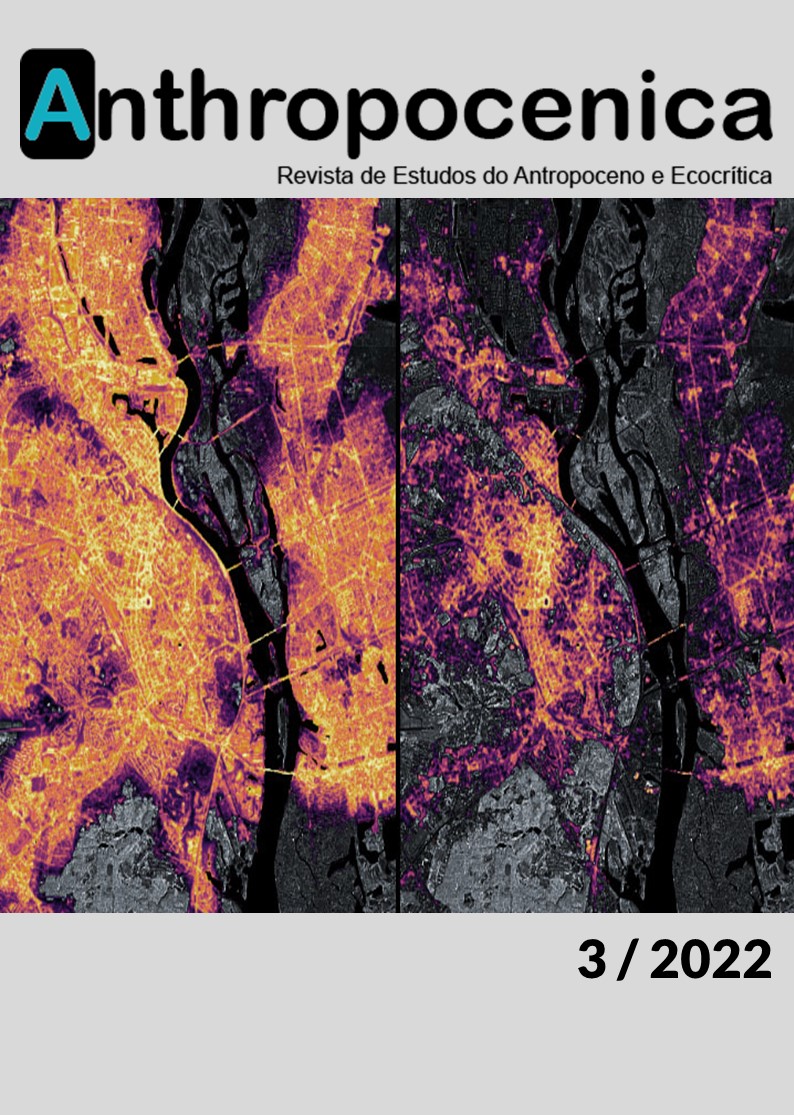The Cry of Gaia in Roberto and Erasmo Carlos´´´ s ecoogical songs
DOI:
https://doi.org/10.21814/anthropocenica.3764Abstract
This article shows how the concern with the poor preservation of the environment, motivated by the wearisome behavior of the human beings in face of Nature reverberates in the songs of the Brazilian singers and composers Roberto and Erasmo Carlos. More specifically, aims to do it through the analysis of their lyrical compositions, from 1976 to 1976, which reveal a change in style that characterized the successes of the “Jovem Guarda” or the eminently romantic songs that had marked the previous two decades of their artistic careers. Approaching the issue in the light of Deep Ecology, it is analyzed here how these musicians started a wave of protest against the imminent extinction of Planet Earth, in which the tone of revolt against the crimes committed by Humanity against Gaia, its own home, stands out.
Downloads
References
Ambrizzi, T. & Araújo, M. (eds). (2014). Base científica das mudanças climáticas. In: Primeiro Relatório da Avaliação Nacional sobre Mudanças Climáticas. Editora da UFRJ. 464 pp.
Boff, L. (2009). A Opção Terra: A Opção para a terra não cai do céu. Record.
Bursztyn, M. & Persegona, M. (2008). A Grande Transformação Ambiental: Uma cronologia da dialética homem-natureza. Garamond.
Campbell, S. (1996). The Land and Language of Desire: Where Deep Ecology and Post-structuralism Meet 124-36. In: Glotfelty, C. & Fromm, H., (eds.) (1996). The Ecocriticism Reader: Landmarks in Literary Ecology. University of Georgia Press.
Capra, F. (1997). A Teia da Vida: Uma nova Compreensão científica dos Sistemas Vivos. Trad. N. Eichemberg). Cultrix.
Carlos, R. & Carlos, E. (1976) O Progresso. CBS. [música gravada por R. Carlos].
Carlos, R. & Carlos, E. (1978). Panorama Ecológico [música gravada por E. Carlos]. Panorama Ecológico. Polydor.
Carlos, R. & Carlos, E. (1979). O Ano Passado [música gravada por R. Carlos]. Roberto Carlos. CBS.
Carlos, R. & Carlos, E. (1981). As Baleias [música gravada por R. Carlos]. Roberto Carlos. CBS.
Carlos, R. & Carlos, E. (1985). Paz na Terra [música gravada por R. Carlos]. Roberto Carlos. CBS.
Carlos, R. & Carlos, E. (1986). Apocalipse [música gravada por R. Carlos]. Roberto Carlos. CBS.
Carlos, R. & Carlos, E. (1987). Águia Dourada [música gravada por R. Carlos]. Roberto Carlos. CBS.
Carlos, R. & Carlos, E. (1989), Amazônia [música gravada por R. Carlos]. Roberto Carlos. CBS.
Carlos, R. & Carlos, E. (2003). Seres Humanos [música gravada por R. Carlos]. Pra Sempre. Sony Music.
Cirlot, J. E. (2001). A Dictionary of Symbols. Trad.: Jack S. Routledge.
Oxford (2010). Dicionário Oxford Escolar – Oxford University Press.
Drummond, J.A. (1999). A Legrislação Ambiental Brasaileira de 1934 a 1988: Comentáros de um cientista ambiental simpático ao conservacionismo. Ambiente & Sociedade, 5, pp. 223-28. UNICAMP.
Duarte, V. (2007). Carta Aberta de Artistas Brasileiros sobre a devastação da Amazônia. Retirado de: https://mundoeducacao.uol.com.br/redacao/carta-aberta.htm Acesso em 23/07/2021
Duve, C. (1997). Poeira Vital – A Vida Como Imperativo Cósmico. Campus.
Ferreira, M. L. (2012). Liberdade e engajamento na obra de Roberto Carlos. Revista Brasileira de Estudos da Canção, 5. Retirado de: http://www.rbec.ect.ufrn.br/Liberdade_e_engajamento_na_obra_de_Roberto_Carlos Acesso em 17/07/2021
Globonews.com. (2002). Roberto Carlos Critica Dogmas Católicos em Nova Música. Na Mira. Retirado de: https://imirante.com/namira/sao-luis/noticias/2002/12/18/roberto-carlos-critica-dogmas-catolicos-em-nova-musica.shtml (Acesso em 03/09/2021)
Instituto Brasileiro Espaço Futuro (2018). Amazônia Conexão Global. Retirado de: https://ibef-brasil.com.br/projeto-amazocircnia-conexatildeo-global.html (Acesso em 19/07/2021)
Kuhl, E. (1995). Animais, Nossos Irmãos. Petit.
Lacaz Ruiz, R., Corrêa, V. F., Tavares, F.A. & Scoton, R.A. (2018). Animalização do Homem: uma Visão Ontológica do Ser Individual e do Ser Social. Revista da USP, 119, pp. 29-43.
Leite, Gisele. (2018). O pós-humanismo. Retirado de:
https://www.jornaljurid.com.br/colunas/gisele-leite/o-pos-humanismo. (A cesso em 02/08/2021)
Le Prestre, P. (2001). Ecopolítica Internacional. Trad. Jacob Gorender. SENAC.
Lovelock, J. (2006). The Revenge of Gaia: Why the Earth Is Fighting Back – and How We Can Still Save Humanity. Allen Lane.
Moratelli, W. (2009). Entrevista a Erasmo Carlos. Retirado de: http://gente.ig.com.br/materias/2009/11/13/erasmo+carlos+me+considero+o+pioneiro+nessa+arte+de+pegar+fas+9082007.html
Moreira, M. M. (1993). Poder, Liberdade e Desenvolvimento: Indicações para o Debate Brasileiro.
Naess, A. (1973). The shallow and the deep, long-range ecology movement. A summary. Inquiry, 16: pp. 1-4; 95-100. DOI: https://doi.org/10.1080/00201747308601682
Naess, A. & Sessions, G. (1984). Basic Principles of Deep Ecology. The Anarchist Library, Retirado de: https://theanarchistlibrary.org/library/arne-naess-and-george-sessions-basic-principles-of-deep-ecology.lt.pdf (Acesso em 13/07/2021)
Nixon, R. (2011) Slow Violence and the Environmentalism of the Poor. Harvard University Press. DOI: https://doi.org/10.4159/harvard.9780674061194
Papa Francisco. (2015). Laudato Si’ [sobre o cuidado da casa comum]. Edições Paulinas.
Rattner, H. (1984). As empresas estatais brasileiras e o desenvolvimento tecnológico nacional. Revista de Administração de Empresa, 24(2): pp. 5-12. DOI: https://doi.org/10.1590/S0034-75901984000200001
Ricardo, B. & Campanille, M. (2008). Almanaque Brasil Socioambiental, Instituto Socioambiental.
Vianna, L.B. (2016). Quarks. Retirado de: https://www.infoescola.com/fisica/quarks (Acesso em 02/08/2021)
Volland, H. (ed). (2017). Handbook of Atmospheric Electrodynamics (volume I). CRC Press.




